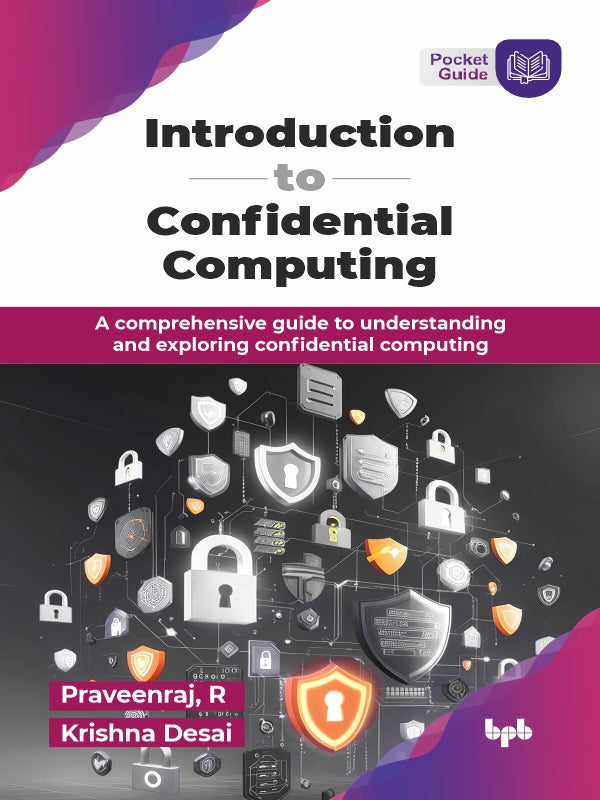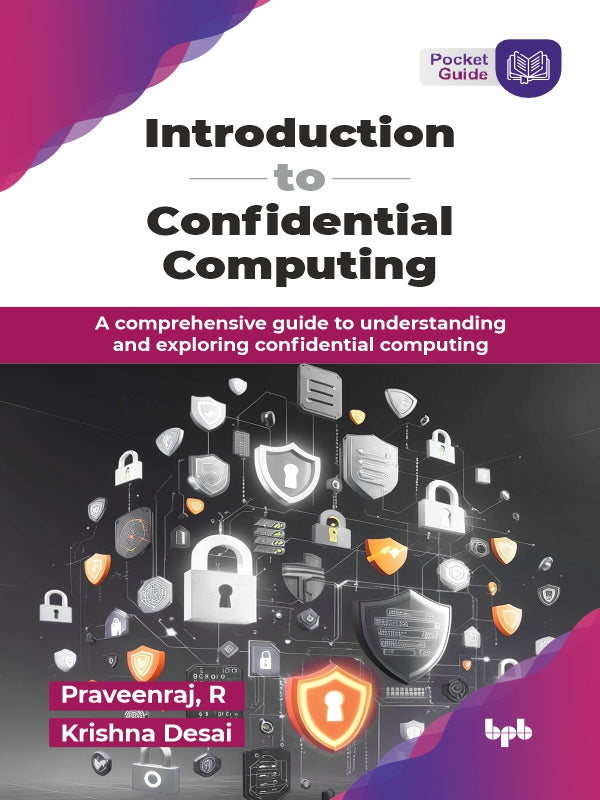Introduction to Confidential Computing
Couldn't load pickup availability
Pocket Guide
ISBN: 9789365892147
eISBN: 9789365891522
Authors: Praveenraj, R, Krishna Desai
Rights: Worldwide
Edition: 2025
Pages: 226
Dimension: 5.5*8.5 Inches
Book Type: Paperback

- Description
- Table of Contents
- About the Authors
In an age where data breaches and privacy issues are growing, confidential computing offers a state-of-the-art solution. This technology helps organizations keep their most sensitive information safe, even against strong threats.
Introduction to Confidential Computing provides a clear guide to this advanced cybersecurity technology. It explains why confidential computing is crucial for protecting sensitive data, covering key technologies, architectures, and frameworks. The book details remote attestation, which ensures computing environment integrity, and explores how confidential computing enhances AI training security. It also reviews solutions from major cloud providers, helping readers choose the right options. This book is perfect for anyone looking to boost their cybersecurity skills and stay ahead in data protection.
By the end of this book, you will gain a thorough understanding of confidential computing and its impact on data security and privacy. You will be ready to assess and implement confidential computing solutions, safeguarding your organization's assets and meeting data privacy regulations.
KEY FEATURES
Comprehensive overview of confidential computing architectures and technologies.
Guidance on leveraging confidential computing technologies for secure data processing and privacy protection.
Learn how confidential computing ensures data privacy and protects AI model integrity through secure processing.
WHAT YOU WILL LEARN
Learn why confidential computing is crucial in today's digital world.
Understand high-level architecture of various trusted execution environments implementations.
Art of developing secure applications that can be deployed on TEE.
Comprehend how remote attestation ensures the integrity of computing environments.
Discover how RA-TLS could reshape the future of secure communications.
Explore how confidential computing protects data and AI models.
WHO THIS BOOK IS FOR
This book is for software architects, security researchers, and developers to enhance application security using confidential computing. PhD candidates and postgraduates will explore TEEs, while AI/ML developers will understand how confidential AI protects data and models.
1. Vital Need for Confidential Computing
2. Trusted Execution Environments
3. Secure Application Development
4. Remote Attestation
5. Confidential Computing in Cloud
6. Confidential Artificial Intelligence
7. Prospects of Confidential Computing
Appendix A: Enclave Initialization Instructions in Intel SGX
Appendix B: Intel TDX Architectural Instructions
Appendix C: Secure Boot Infrastructure Terminologies
Praveenraj, R is a security enthusiast with extensive experience in the open-source community. For the past seven years, he has been actively involved in developing and enhancing security technologies through Intel® Security Libraries. His work includes significant contributions to container runtime projects such as containerd, ocicrypt, ocicrypt-rs, and katacontainers, where he has focused on advancing security features and solutions.
Currently, Praveenraj works for Intel® Trust Authority. Intel Trust Authority is Software as a Service that remotely attests to the authenticity and integrity of confidential computing environments and related workloads, regardless of workload location.
Praveenraj holds a master’s degree in computer science from RVCE, Bangalore. Beyond his professional achievements, he has a passion for traveling, which allows him to explore new cultures and landscapes. He practices yoga to maintain balance and mindfulness in his life and enjoys sketching as a creative outlet to express his artistic side.
Krishna Desai is a dedicated and passionate individual with a profound interest in the ever-evolving fields of machine learning and cloud security. In the realm of machine learning, Krishna has primarily contributed to developing cutting-edge machine learning models for various applications, with a particular focus on image classification and segmentation.
She is currently working at Intel contributing to development of Intel® Trust Authority which provides remote verification of the trustworthiness of a compute asset based on attestation, policy, and reputation/risk data.
She has completed her master’s in machine learning from PES University, Bangalore. She was also a topper in her master’s program, demonstrating not only her passion for the subject matter but also her exceptional academic achievements.
Beyond her professional achievements, Krishna has a passion for traveling, singing, and practicing mandala art, a tool for meditation and self-reflection, as the repetitive patterns and symmetrical designs can help to calm the mind and promote a sense of inner peace.


